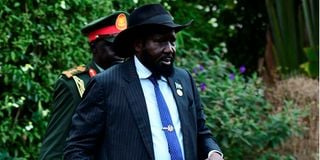
South Sudan's President Salva Kiir Mayardit arrives for the Intergovernmental Authority on Development (Igad) 42nd Extraordinary Session, at the State House in Entebbe, Uganda on January 18, 2024.
South Sudan’s senior state officials may be in, and out of, government, any time. That has been President Salva Kiir’s nature of operation since 2020, where several senior officials were appointed and chucked in under a year in office.
The country is currently heading towards a critical time in transition where President Kiir has to decide whether to hold elections in December as earlier planned or extend the transitional government of national unity and allow time for preparations.
This week, Kiir met in Nairobi with negotiators involved in drafting a roadmap that could end up with a new constitution, enhancing what sources had indicated that no elections are possible this year.
According to sources, three key protocols that have been finalised are to be initialed anytime from now, concluding the discussions in the halls, and allowing time for a roadmap to be publicised.
But back home, his ministers, including those from different factions that signed on a peace deal in 2018, to serve in a coalition government have been uneasy.
The latest to be sacked is former minister for presidential affairs, Bangasi Joseph Bakosoro. A former Governor of Western Equatoria, he was in July 2021 lured to abandon his South Sudan Movement for Change (SSMC) Party to join the ruling SPLM.
Under the 2018 peace deal, factions nominated their ministers according to clusters provided for in the peace agreement known as Revitalised Agreement on the Resolution of Conflict in South Sudan (R-ARCSS), mediated by the Intergovernmental Authority on Development (Igad). The group negotiating in Nairobi had refused to sign on that deal, but have since accepted to be part of talks for a new constitution.
But Kiir broke the code when in March 2023, he swapped Angelina Teny—the wife of Dr Riek Machar, the First Vice-President, from the Defence and Veterans’ affairs ministry to the Interior. The move was against the terms of the 2018 peace agreement, where signatories had been assigned specific ministries.
The row began earlier. In 2020, President Kiir fired finance ministers; Awow Daniel Chuong; Athian Ding Athian; Agak Achuil Lual; Awow Daniel Chuang; Salvatore Garang Mabiordit: Athian Ding Athian: Agak Achuil Lual and Dier Tong Ngo among many.
Officially, Juba has given reasons varying, from allegations of corruption and incompetence to attempts to effect reforms.
In some cases, these changes have been part of efforts to uphold the 2018 peace agreement, which mandates power-sharing among various political factions, official dispatches showed.







